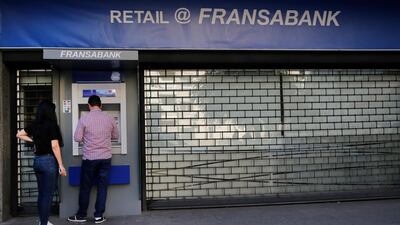Lebanon's banks will open for the first time in nearly two weeks on Friday, after nationwide protests and a deteriorating economic crisis forced their closure, the Association of Banks in Lebanon said.
"Banks will resume normal work from Friday November 1 and because of a backlog of work due to the closure, working hours of banks will be extended on Friday and Saturday until 5pm," the association said in a statement on Thursday. The board of the association met with the governor of the central bank Riad Salameh.
Mr Salameh has said no capital controls will be implemented by banks, however citizens and businesses have been complaining they face withdrawal limitations and are unable to access foreign currency and analysts have said the longer the banks remain closed, the greater the risk of a run on lenders by depositors when normal operations resume. Consumer and investor confidence in Lebanon have sunk as the economy systematically decelerated since the outbreak of war in neighbouring Syria in 2011 and deposit growth turned negative in the first half of the year.
Lebanon has been gripped by widespread protests for the past two weeks demanding an end to nepotism and corruption that have led the country’s public debt to soar to $86 billion, or equivalent to 150 per cent of gross domestic product, one of the highest in the world. Lack of political consensus on what reforms to implement in the national unity government led Prime Minister Saad Hariri to resign on Tuesday.
Most of Lebanon’s sovereign debt is held by local banks and the financial system, which underpins the economy, attracted billions of dollars in capital flows that helped the country service its fiscal and external deficits since the end of a 15 year civil war in 1990.
Lebanon’s pound, pegged to the US dollar since 1997, has been under pressure over the past three months as the economic crisis in the country worsens and demand for foreign currency increases.
Rating agencies have cut the sovereign ratings of Lebanon and of its banks as a result of liquidity risks that have been exacerbated by political tensions.
Lebanon’s economic growth is projected to slow to 0.2 per cent this year, from about 0.3 per cent in 2018, according to the International Monetary Fund. Prior to Mr Hariri’s resignation, the fund said it was assessing an emergency economic reform package unveiled by the Lebanese government that sought to tax banks and cut pay of officials, in an attempt to avert a financial crisis.
The emergency plan, announced by Mr Hariri on October 21, proposed a 2020 budget that targets a fiscal deficit of 0.6 per cent of GDP.
Roads once again were closed on Thursday after the capital Beirut had some respite following Hariri's resignation.


